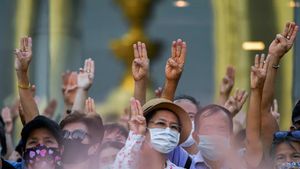On the eve of Germany's Bundestagswahl, major political candidates gathered for the television event titled Bürger-Speed-DATING, broadcast on ProSieben, Sat.1, and Joyn. This unique format, which aired at 20:15, presented Olaf Scholz, the Chancellor and SPD candidate, Robert Habeck, the Green candidate and current Minister of Economic Affairs, and Alice Weidel, the AfD candidate, as they faced questions from members of the public, each having three minutes to discuss their viewpoints on pressing national issues.
With election day just around the corner, this was seen as the last chance to connect with undecided voters. Each candidate was allowed to respond to questions from ten participants, covering topics such as the defense capabilities of Germany, healthcare reforms, and tackling racism and hate.
One participant, 25-year-old Swantje, raised concerns about Germany's military readiness, pressing Scholz for solutions. He responded by asserting the need for increased defense spending, referencing the neglect it had faced since the 1990s. Habeck, who previously resisted military service, emphasized the need for peace, stating, “We should aim for peace first.” He insisted on improved military resources funded through loans. Weidel caused controversy by advocating for the reinstatement of mandatory military service, stirring debate among participants.
Another participant, Stefanie, confronted candidates about the healthcare system, echoing sentiments of overburdened medical professionals. Scholz defended recent reforms aimed at improving hospital conditions, touting the government’s achievements yet acknowledging there is still much work to be done. Habeck admitted his shortcomings on healthcare knowledge, stating, “If I’m honest, I need your help,” as he sought advice from Stefanie on digital billing issues. Weidel highlighted the inadequate salaries for healthcare workers but failed to clarify her proposed funding sources.
The format faced questions about its fairness, particularly with the absence of CDU candidate Friedrich Merz. Initially part of the lineup, Merz canceled his participation at the last minute due to “scheduling conflicts,” according to statements from the CDU. Critics viewed his absence as detrimental, as polls showed Merz's party leading, raising questions about his commitment to engage with voters.
Forum moderator Linda Zervakis, along with Paul Ronzheimer, facilitated the evening, emphasizing the direct, immediate engagement the format promised. Participants had the chance to confront Weidel directly about her party's stance on ethnic issues, particularly racist sentiments within the AfD. “It’s not about skin color, it’s about people,” Weidel asserted, defending her party against accusations of promoting xenophobia, even mentioning her children’s background as evidence of her inclusive views.
The event was not just reactive; it included proactive discussions on climate change. Johannes questioned how candidates would manage environmental policies. While Habeck criticized the lack of focus from the FDP on sustainable transport, Weidel controversially referred to climate change as “a debatable topic,” sparking pushback from the attendees who demanded actionable plans.
This final event showcased the candidates' strategies to win over voters—with mixed results. For many, the candidates’ responses raised more questions than they answered, particularly about funding strategies for healthcare and defense improvements, and whether their policy proposals were feasible or merely aspirational.
The reception of the event pointed to the effectiveness of direct voter engagement—though reactions on social media varied widely. The lack of one prominent candidate stirred significant online discussions about how much physical presence matters during campaigns, especially for individuals like Merz, whose attendance could have provided much-needed representation for his party.
Despite criticisms and high-stakes pressure from this unique voter engagement approach, the candidates pressed on. Voters left the event with clearer portraits of each contender’s priorities for Germany’s future, with polling impending the following day.
Overall, Bürger-Speed-DATING served as not only a political battleground but as a vivid glimpse of the candidates’ personas and how they can connect—or fail to connect—with the electorate. This innovative format could pave the way for future political engagements, highlighting the need for transparency and direct accountability from those vying for power.



